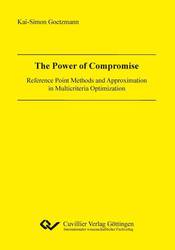| Areas | |
|---|---|
| Serie de libros (97) |
1381
|
| Nachhaltigkeit |
3
|
| Gesundheitswesen |
1
|
| Letra |
2370
|
| Ciencias Naturales |
5407
|
| Matemática | 228 |
| Informática | 319 |
| Física | 980 |
| Química | 1364 |
| Geociencias | 131 |
| Medicina humana | 243 |
| Estomatología | 10 |
| Veterinaria | 108 |
| Farmacia | 147 |
| Biología | 835 |
| Bioquímica, biología molecular, tecnología genética | 121 |
| Biofísica | 25 |
| Nutrición | 45 |
| Agricultura | 1005 |
| Silvicultura | 201 |
| Horticultura | 20 |
| Ecología y conservación de la tierra | 148 |
| Ciencias Ingeniería |
1798
|
| General |
98
|
|
Leitlinien Unfallchirurgie
5. Auflage bestellen |
|
Erweiterte Suche
The Power of Compromise (Tienda española)
Reference Point Methods and Approximation in Multicriteria Optimization
Kai-Simon Goetzmann (Autor)Previo
Lectura de prueba, PDF (130 KB)
Indice, PDF (50 KB)
Klassische Optimierungstheorie geht davon aus, das es eine einzige Zielfunktion gibt, die optimiert werden soll: Finde die günstigste Lösung, oder die schnellste, oder die mit der besten Qualität. Tatsächlich suchen wir in der Praxis häufig Lösungen, die sowohl günstig sind, als auch schnell zu erreichen, und obendrein eine gute Qualität haben. Meist stehen diese mehreren Kriterien freilich im Konflikt – es wird keine Lösung geben, die in allen Kriterien das Optimum erreicht. In der multikriteriellen Optimierung werden daher erweiterte Lösungskonzepte betrachtet. Ein in der Praxis sehr populäres Konzept ist die sogenannte Referenzpunktmethode, mit dem Sonderfall des Compromise Programming. Die Arbeit The Power of Compromise liefert eine umfassende theoretische Analyse dieser Konzepte, und zeigt ihre Mächtigkeit auf: Die Fähigkeit, Referenzpunktlösungen zu berechnen oder zumindest zu approximieren, ist (im komplexitätstheoretischen Sinne) gleich zu setzen mit der Fähigkeit, die Menge aller Pareto-optimalen (d.h. nicht-dominierten) Lösungen zu berechnen bzw. zu approximieren. Die theoretischen Resultate werden durch zwei Beispiele der praktischen Anwendung der Referenzpunktmethode ergänzt.
In classical optimization theory, it is usually assumed that there is a single objective that is to be optimized: Find the cheapest solution, or the quickest, or the one of highest quality. In practice, however, we are often looking for solution that are both cheap, and quick, and of good quality. Usually these multiple criteria are in conflict – there won’t be a solution that is optimal in all objectives. Multicriteria optimization therefore studies extended solution concepts. One of these concepts is the so-called reference point method, including the special case of compromise programming. The thesis The Power of Compromise presents a comprehensive theoretical analysis of these concepts, and demonstrates their power: The ability to compute or at least approximate reference point solutions is (in the complexity theoretical sense) equivalent to the ability to compute, respectively approximate, the set of all Pareto optimal (i.e., non-dominated) solutions. The theoretical results are complemented by two examples of practical applications of the reference point method.
| ISBN-13 (Impresion) | 9783954045433 |
| ISBN-13 (E-Book) | 9783736945432 |
| Formato | A5 |
| Idioma | Inglés |
| Numero de paginas | 156 |
| Laminacion de la cubierta | mate |
| Edicion | 1. Aufl. |
| Lugar de publicacion | Göttingen |
| Lugar de la disertacion | TU Berlin |
| Fecha de publicacion | 31.10.2013 |
| Clasificacion simple | Tesis doctoral |
| Area |
Matemática
Informática |
| Palabras claves | Multicriteria Optimization, Discrete Mathematics, Approximation, Reference Point Methods, Compromise Programming, Angewandte Mathematik |








